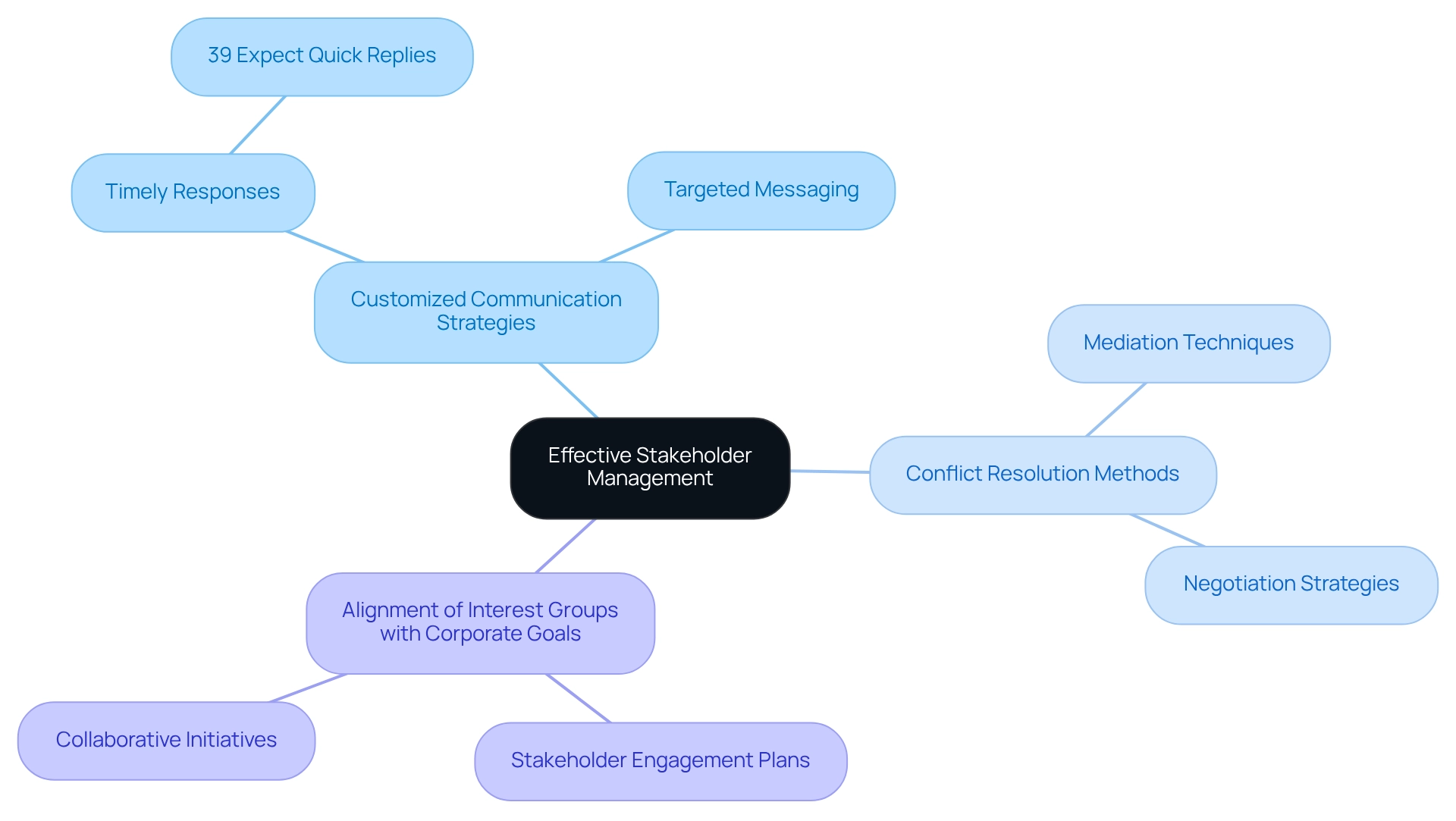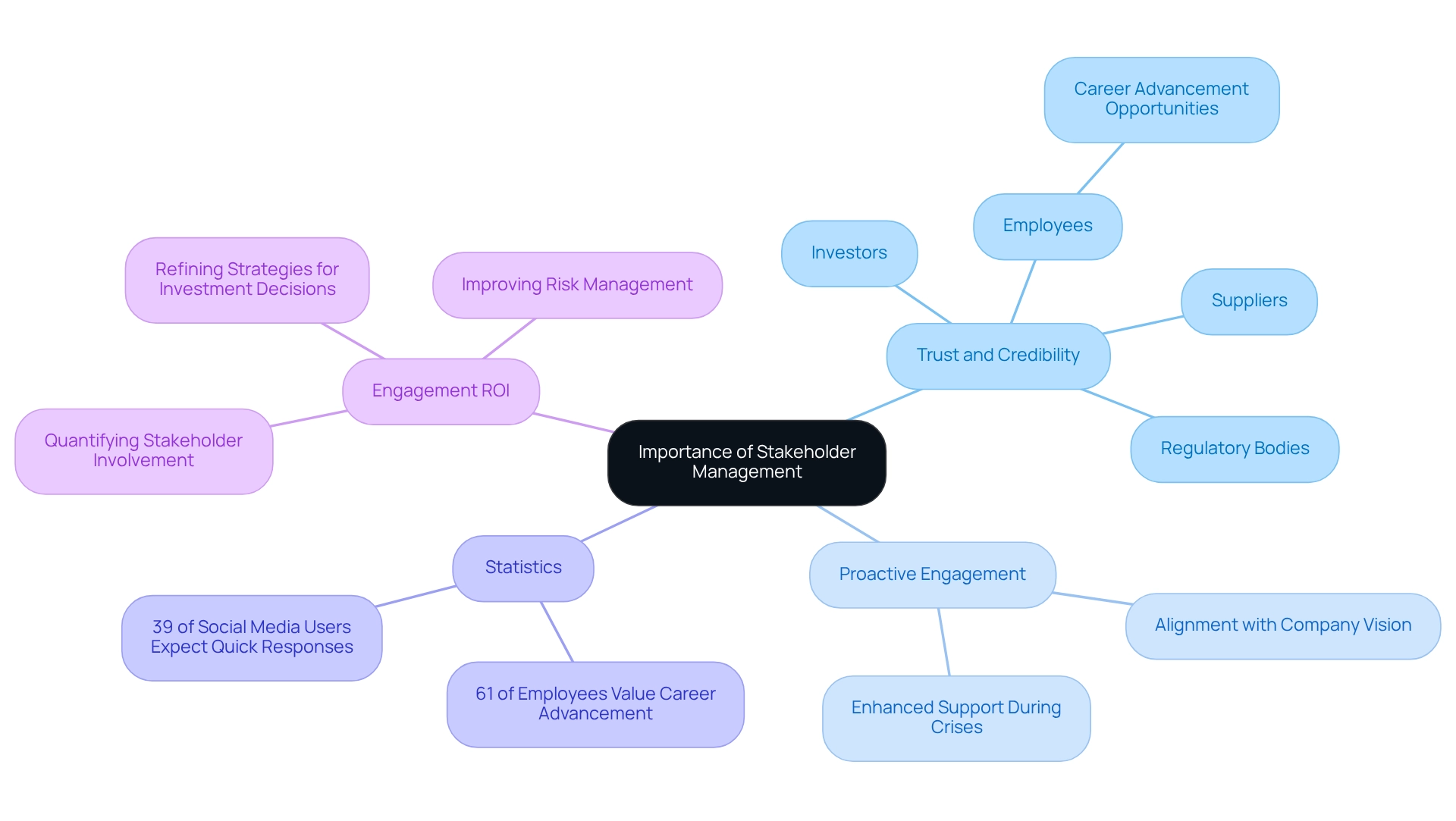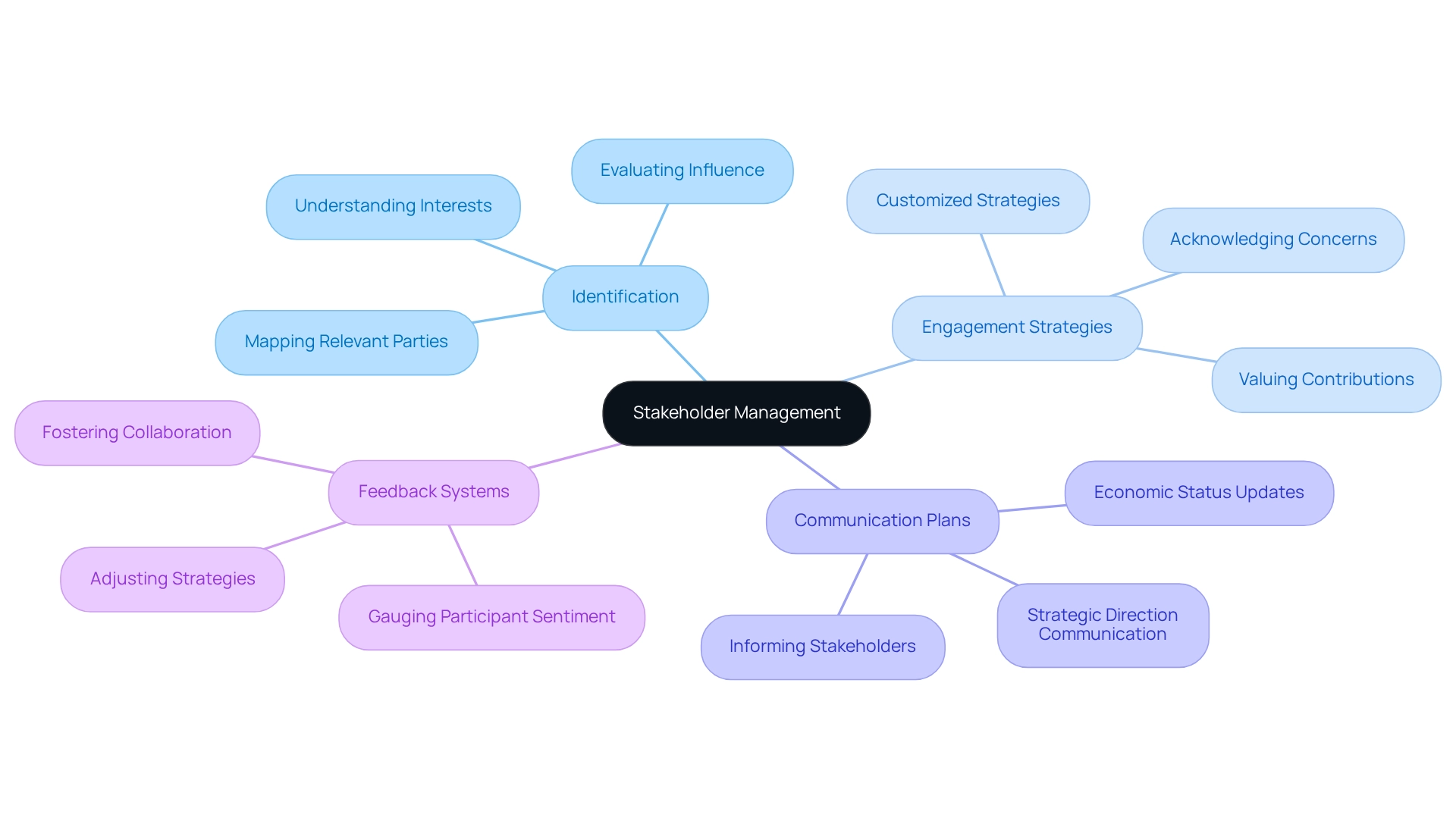Overview
Effective stakeholder management for CFOs is crucial in systematically identifying, engaging, and nurturing relationships with individuals or groups that significantly impact the organization. This strategic approach not only enhances economic performance but also fosters sustainable growth. The article underscores the necessity of:
- Tailored communication strategies
- Conflict resolution
- Proactive engagement
How do these elements contribute to building trust and aligning stakeholders with corporate goals, particularly during economic challenges? By implementing these strategies, CFOs can effectively navigate complex environments and drive organizational success.
Introduction
In the intricate realm of modern business, effective stakeholder management stands as a critical imperative, particularly for Chief Financial Officers (CFOs). As organizations confront financial challenges and pursue sustainable growth, the capacity to identify, engage, and cultivate relationships with key stakeholders—from investors to employees—becomes essential. This strategic endeavor not only bolsters financial performance but also nurtures a collaborative atmosphere that aligns stakeholder interests with corporate objectives.
Moreover, with statistics illustrating the escalating expectations for timely communication and engagement, the necessity of a well-structured stakeholder management framework becomes evident. By concentrating on tailored strategies and robust feedback mechanisms, CFOs can navigate immediate crises while establishing a resilient foundation for long-term success.
Define Effective Stakeholder Management
What is effective stakeholder management is a strategic process that encompasses the systematic identification, analysis, and engagement of individuals or groups affected by a company's operations and decisions. For CFOs, this entails not only understanding the financial implications of these relationships but also fostering positive interactions that can significantly influence organizational success. This process includes various components, such as:
- Customized communication strategies
- Conflict resolution methods
- The alignment of interest groups with corporate goals
By ensuring that all parties are informed and actively engaged, CFOs can cultivate a collaborative atmosphere that supports the organization's objectives.
Recent statistics reveal that 39% of social media users expect prompt replies, underscoring the importance of timely and effective communication in managing relationships. Moreover, case studies emphasize the significance of statistical validity in evaluating engagement effectiveness, demonstrating that a blend of quantitative rigor and qualitative context is essential for capturing the full spectrum of participant interactions. Ultimately, understanding what is effective stakeholder management is crucial for CFOs, as it not only enhances economic performance but also establishes a resilient framework for sustainable growth.

Explain the Importance of Stakeholder Management
For CFOs, understanding what is effective stakeholder management is paramount, especially in the face of economic challenges. Understanding what is effective stakeholder management involves establishing trust and credibility with stakeholders—including investors, employees, suppliers, and regulatory bodies—to secure investments, negotiate with creditors, and sustain customer loyalty. In times of crisis, these relationships can profoundly impact a company's recovery trajectory.
Proactive engagement with stakeholders exemplifies what is effective stakeholder management, ensuring alignment with the company's vision and fostering enhanced support and resources during critical periods. Furthermore, strong connections with stakeholders not only facilitate swift financial recovery but also bolster the company's reputation, yielding long-term benefits.
Notably, statistics reveal that 61% of employees consider career advancement opportunities essential for building trust, highlighting the importance of internal stakeholder engagement. Additionally, a recent survey found that 39% of social media users expect prompt responses, underscoring the necessity for timely communication strategies.
The concept of Engagement ROI further illustrates the significance of stakeholder involvement, as organizations that assess this can refine their strategies for better investment decisions and risk management. Ultimately, understanding what is effective stakeholder management is not just a requisite for crisis management; it is a strategic imperative that can drive sustainable growth.

Identify Key Components of Stakeholder Management
Understanding what is effective stakeholder management involves several critical elements: identification, interaction strategies, communication plans, and feedback systems.
- Stakeholder identification necessitates a comprehensive mapping of all relevant parties, coupled with an understanding of their interests and an evaluation of their influence on the organization.
- Customized engagement strategies are essential for each interest group, ensuring that their concerns are acknowledged and their contributions valued.
- Furthermore, communication strategies are vital for keeping interested parties informed about the organization's economic status and strategic direction, especially during restructuring efforts.
- In addition, robust feedback systems empower CFOs to gauge participant sentiment and adjust strategies accordingly, fostering a culture of collaboration and transparency.
By prioritizing these elements, CFOs can establish a comprehensive framework for engagement that aligns with the organization's financial objectives. Notably, research indicates that 50% of a company's value often derives from just 15-20 key stakeholder roles, which underscores what is effective stakeholder management in driving financial success.

Conclusion
Effective stakeholder management is not merely a best practice for CFOs; it is a strategic necessity that underpins organizational success in today's complex business landscape. By systematically identifying and engaging stakeholders, CFOs can enhance financial performance while fostering a collaborative environment that aligns diverse interests with corporate objectives. The importance of timely communication, as highlighted by statistics on stakeholder expectations, cannot be overstated; it is essential for building trust and credibility, particularly during financial challenges.
The core components of stakeholder management—identification, tailored engagement strategies, communication plans, and feedback mechanisms—form a robust framework that enables CFOs to navigate crises effectively and drive sustainable growth. By prioritizing these elements, organizations can cultivate strong relationships that not only contribute to immediate recovery but also enhance long-term reputation and stakeholder loyalty.
Ultimately, embracing effective stakeholder management equips CFOs with the tools to create a resilient organizational foundation, ensuring that all voices are heard and valued. In a world where stakeholder expectations are continually evolving, the ability to adapt and respond proactively is paramount to achieving enduring success.
Frequently Asked Questions
What is effective stakeholder management?
Effective stakeholder management is a strategic process that involves the systematic identification, analysis, and engagement of individuals or groups affected by a company's operations and decisions.
What role do CFOs play in stakeholder management?
CFOs are responsible for understanding the financial implications of stakeholder relationships and fostering positive interactions that can significantly influence organizational success.
What are the key components of effective stakeholder management?
Key components include customized communication strategies, conflict resolution methods, and aligning interest groups with corporate goals.
Why is timely communication important in stakeholder management?
Timely communication is crucial because 39% of social media users expect prompt replies, highlighting the need for effective communication in managing relationships.
How can the effectiveness of engagement be evaluated?
The effectiveness of engagement can be evaluated using statistical validity, which combines quantitative rigor with qualitative context to capture the full spectrum of participant interactions.
What are the benefits of effective stakeholder management for CFOs?
Effective stakeholder management enhances economic performance and establishes a resilient framework for sustainable growth.




